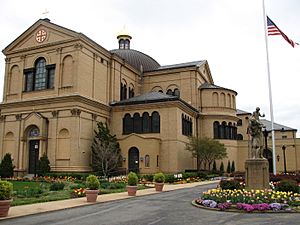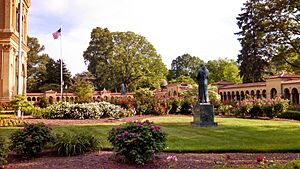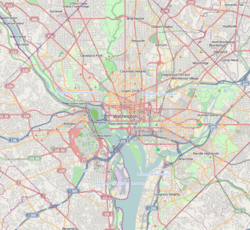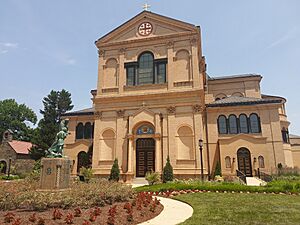Franciscan Monastery of the Holy Land in America facts for kids
Quick facts for kids Franciscan Monastery of the Holy Land in America |
|
|---|---|

Franciscan Monastery of the Holy Land in America (2006)
|
|
| Religion | |
| Affiliation | Roman Catholic |
| District | Archdiocese of Washington |
| Ecclesiastical or organizational status | Friary/Monastery |
| Location | |
| Location | 1400 Quincy St. N.E. Washington, D.C., United States |
| Architecture | |
| Architect(s) | Aristide Leonori |
| Architectural type | Friary |
| Architectural style | Neo-Byzantine |
| Groundbreaking | 1898 |
| Completed | 1899 |
| U.S. National Register of Historic Places | |
| Added to NRHP | 17 January 1992 |
|
Franciscan Monastery and Memorial Church of the Holy Land
|
|
| Area | 44 acres (18 ha) |
| NRHP reference No. | 91001943 |
| Website | |
| www.myfranciscan.org | |
The Franciscan Monastery of the Holy Land in America is a special place in Washington, D.C.. It's a large complex run by Franciscan friars. You can find it in the Brookland neighborhood.
This monastery sits on a hill called Mount Saint Sepulcher. It has a main church, beautiful gardens, and copies of important religious sites. There are also replicas of shrines from Palestine and catacombs from Rome. The monastery also holds an archive, a library, and even some ancient bones. These bones belong to Saint Benignus of Armagh. They were brought from the Roman catacombs and were once in a cathedral in Narni, Italy.
Contents
History of the Franciscan Monastery
The idea for the monastery began in 1880. A priest named Charles A. Vassani started the U.S. Commissariat of the Holy Land in New York City. He and Father Godfrey Schilling, another Franciscan, dreamed of building a "Holy Land in America." They wanted to create a place that felt like the Holy Sepulcher.
At first, they thought about building it on Staten Island. This location would have overlooked New York's harbor. However, these plans changed. They decided on a wooded hilltop in Brookland, Washington, D.C. In 1897, Father Godfrey bought the McCeeney Estate there. This land was perfect for a new monastery and church.
Six Franciscan Brothers lived in the old McCeeney house. After buying the land, Father Schilling visited the Holy Land. He took many measurements and photos of the holy sites. This helped him plan the new buildings. In February 1898, construction began. The first stone was laid on Saint Joseph's Day.
Building the holy shrines, gardens, and the Rosary Portico took several years. The main church was officially opened in September 1924. This was 25 years after its dedication. In January 1992, the monastery was added to the National Register of Historic Places. This means it's recognized as an important historical site.
Architecture and Design

The Memorial Church of the Holy Sepulcher was designed by Aristide Leonori. He was a famous architect. Construction started in 1898 and finished in 1899.
The church's design reminds people of the Church of the Holy Sepulchre in Jerusalem. Its floor plan looks a bit like the five-part Jerusalem cross. The building style is neo-Byzantine. This means it looks like old Byzantine churches, similar to Hagia Sophia in Constantinople. Some Romanesque influences were also added to the design.
Rosary Portico
The Rosary Portico was designed by John Joseph Earley. It wraps around the church. This portico has fifteen small chapels. Each chapel shows one of the mysteries of the Rosary. Inside each chapel, you can find plaques. These plaques have the Hail Mary prayer written in almost 200 different languages. The Rosary Portico looks like the cloisters of St. John Lateran and Saint Paul's Outside the Walls in Rome. Many Christian symbols from ancient catacombs decorate its outside.
Monastery Grounds
The monastery building itself is built in a neo-Romanesque style. The grounds around the monastery are very special. They have copies of shrines found in the Holy Land. There's also a Lourdes grotto, which is a replica of a famous cave in France. Another replica is the Porziuncola, a small chapel important to St. Francis. Many artists and architects have helped create this beautiful site over the years.
Library and Archives
The monastery has a library and archives. These collections hold many materials about the Holy Land. They also have information about how the monastery was built. You can find details about monastery life and a large collection of special religious clothing called vestments.
Music at the Monastery
Organ Recitals
The monastery has a special organ built by Lively-Fulcher. It was installed in 2003. This new organ replaced an older one. The monastery often holds monthly organ recitals. These are concerts where people can come and listen to the beautiful music.
 | Laphonza Butler |
 | Daisy Bates |
 | Elizabeth Piper Ensley |




